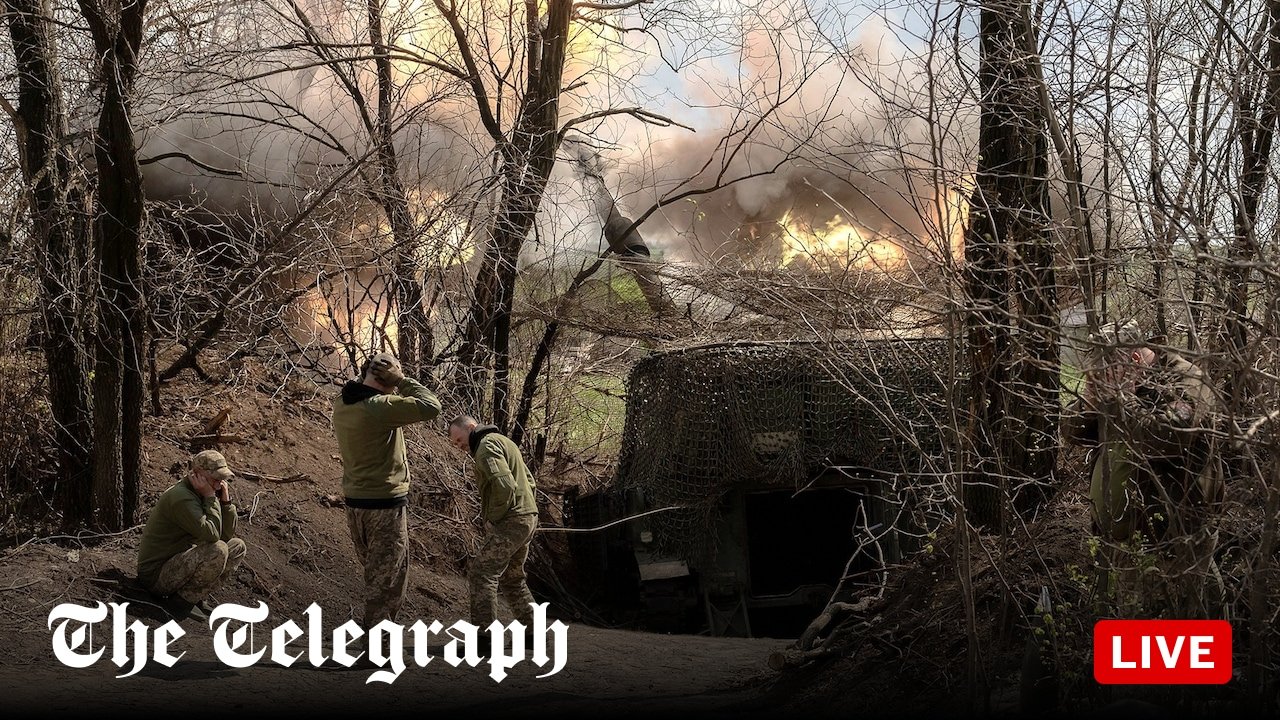Russia said it was waiting for a signal from Ukraine to start direct negotiations to end the war.
The Kremlin said it was ready to enter “unconditional” one-to-on peace talks fro the first time since March 2022, shortly before the war started.
Asked by a reporter if the signal for direct talks should come from Ukraine or the United States, Kremlin spokesman Dmitry Peskov said: “Well, from Kyiv, at least Kyiv should take some actions in this regard. They have a legal ban on this. But so far we don’t see any action.”
The Ukrainian president banned direct talks with Vladimir Putin after he illegally annexed four Ukrainian regions. Volodymyr Zelensky has said he would be willing to hold direct negotiations with Moscow but only if a temporary ceasefire was agreed upon first.
Donald Trump is trying to get Russia and Ukraine to agree to a peace plan that would include a freezing of the front lines and the US recognise Crimea as Russia
Mr Trump last night said he believes Mr Zelensky is ready to give up Crimea following talks with the Ukrainian leader in the Vatican on the sidelines of the Pope’s funeral.
Russia has expanded its military presence near its border with Finland in preparation for a potential clash with Nato, the Wall Street Journal reported on Monday.
Military bases near the Russian city of Petrosavodsk, around 100 miles east of Finland, have been expanded, which has been touted as a new headquarters for tens of thousands of troops.
Western military and intelligence officials have warned these units could form the “backbone” of Russia’s forces preparing to confront Nato.
Donald Trump believes Volodymyr Zelensky is ready to “give up” Crimea in a peace deal with Russia.
“Oh, I think so,” Mr Trump told reporters on Sunday evening, in response to a question on whether he thought the Ukrainian president was ready to concede the territory that Russia occupied in 2014.
Mr Zelensky had previously rejected a US proposal to formally recognise Crimea as Russian territory, which would violate international law.
He said his message to Vladimir Putin was clear. “I want him to stop shooting, sit down and sign a deal.”
Sergei Lavrov, Russia’s foreign minister, said his country would not “negotiate its own territory”, claiming Crimea was a “done deal” ahead of a “critical week” of negotiations.
Russian troops have taken control of the village of Kamianka in the Kharkiv region, Moscow’s state news agency RIA reported today.
Russia launched a surprise offensive in the region last May after they were driven out by Ukraine at the start of the war.
Kharkiv has since resisted a full-scale offensive, though Russia claims to have captured a number of villages since the start of the year.
Germany has overtaken Britain to become Europe’s biggest spender on defence and in real terms and the fourth largest in the world after the US, China and Russia.
Defence spending increased by 28 per cent last year, outpacing all European countries for the first time since the end of the Cold War, the Stockholm International Peace Research Institute said.
The think tank’s annual report said German military spending hit about £66.2bn. The UK spent £61.2bn. Ukraine and France both spent about £48.4bn.
The boom in defence spending was driven by a €100 billion special fund to revitalise Germany’s long-neglected army after Russia’s illegal invasion of Ukraine.
Russia said the imperative was on Ukraine to start direct negotiations to end the war.
The two countries have not held direct talks since March 2022. Volodymyr Zelensky later banned direct talks with Vladimir Putin after he illegally annexed four Ukrainian regions.
Asked by a reporter if the signal for direct talks should come from Ukraine or the United States, a Kremlin spokesman said: “Well, from Kyiv, at least Kyiv should take some actions in this regard. They have a legal ban on this. But so far we don’t see any action.”
North Korea’s announcement that it has sent troops to battle Ukrainian forces in Russia’s Kursk region comes at a crucial moment in peace negotiations.
Although Russian military bloggers insisted the region was not yet fully retaken, Vladimir Putin declared on Saturday that all Ukrainian troops had been expelled. He is now “personally thanking” Kim Jong Un for aiding in the “liberation” of Kursk.
Regardless of the true situation on the ground, the projection of regaining Kursk removes a major obstacle for the Kremlin. Moscow was never likely to agree to a peace deal with Ukraine while any portion of its territory remained occupied.
Volodymyr Zelensky’s bold incursion into Kursk last August was intended to tip negotiations in Kyiv’s favour, offering the captured territory as a bargaining chip for parts of Ukraine still under Russian control.
Now, with Kursk “liberated,” the Kremlin can approach peace talks at a critical moment under the pretence that no part of Russia is under Ukrainian occupation.
Moscow has said its claims over five Ukrainian regions, including Crimea, were “imperative” to talks aimed at ending the war.
“International recognition of Russia’s ownership of Crimea, Sevastopol, the Donetsk People’s Republic, the Lugansk People’s Republic, the Kherson and Zaporizhzhia regions is imperative,” Sergei Lavrov, Russia’s foreign minister, told Brazilian newspaper O Globo.
A peace proposal presented to Russia and Ukraine by the US would give Moscow de jure recognition of the land it has occupied since the start of the war, and de facto recognition of Crimea.
Johann Wadephul, a pro-Ukraine politician from the conservative CDU, will be Germany’s next foreign minister, the party has announced.
Johann Wadephul, 62, has long been a close confidant of incoming chancellor Friedrich Merz and is known for pushing for more weapons to support Ukraine, including long-range Taurus missiles.
Donald Trump was full of praise for Volodymyr Zelensky on Sunday following their meeting at Pope Francis’s funeral, which took place days after he accused the Ukrainian leader of starting the war with Russia.
The Telegraph spoke to officials close to the talks, who revealed how their extraordinary meeting unfolded moments before the funeral.
After paying their respects in front of the Pope’s coffin, Prince William and Sir Keir Starmer walked side by side through St Peter’s Basilica.
It was there, somewhere under the 17th-century renaissance arches leafed in gold, that they spotted a huddle between Emmanuel Macron, Volodymyr Zelensky and Donald Trump.
Talks to end the war in Ukraine had begun in one of the most sacred sites in the Catholic Church, and they were gathering pace.
The Prince read the room and respectfully peeled away from his Prime Minister to allow him to enter negotiations.
Shortly after, Mr Zelensky and Mr Trump, the two men who had so woefully fallen out in front of the cameras in the Oval Office, would find a quiet corner to sit face-to face and hash out their differences.
Copy link
twitter
facebook
whatsapp
email
Ukraine-Russia war live: Kremlin ‘waiting for Kyiv’ on direct talks – The Telegraph



